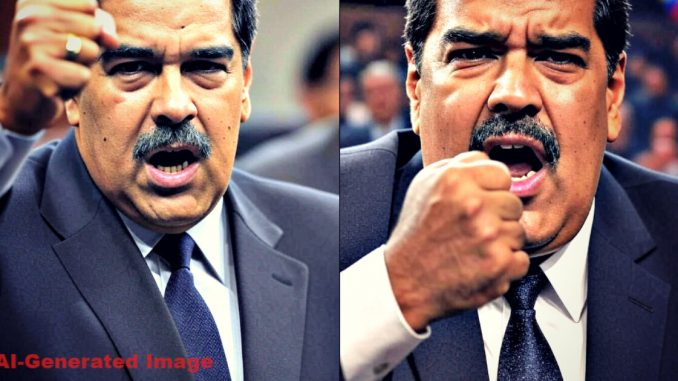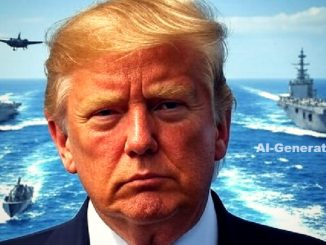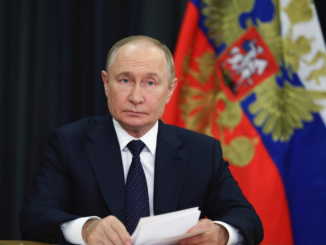
Nicolas Maduro, Bolivarian dictator of Venezuela. – AI-generated image by Grok.
| Published August 26, 2025
A Sudden Military Buildup
Venezuela’s government has deployed 15,000 troops and police forces to the border states of Zulia and Táchira, sparking alarm in Bogotá and drawing immediate international attention. The announcement, made by Venezuelan Interior Minister Diosdado Cabello on state television, was framed as part of a Bolivarian defense strategy against an alleged U.S. invasion threat.
What has made the deployment more controversial, however, is Cabello’s assertion that the movement occurred with the “knowledge and cooperation” of Colombia’s President Gustavo Petro—a claim that has placed Petro directly in the political crossfire.
The U.S. Factor
The move comes just days after the United States Navy positioned a marine amphibious squadron in the southern Caribbean. Washington has not ruled out increased military pressure on Caracas, escalating tensions with the Maduro regime.
Colombian officials have repeatedly warned that any external intervention in Venezuela could have devastating consequences, from a new refugee crisis spilling into Colombian territory to a shock in global oil markets. President Petro, who has positioned himself as a mediator in regional conflicts, now faces the challenge of proving he can remain neutral while defending national sovereignty.
Pressure on Petro
At home, opposition lawmakers are accusing Petro of being too close to Maduro and of potentially undermining Colombia’s security interests. The Colombian president’s critics warn that any perception of alignment with Caracas could weaken Bogotá’s diplomatic credibility and deepen divisions in an already polarized political climate.
Analysts also point to the risks for Colombia’s economy, particularly Ecopetrol, the state-owned oil company, which could be hit hard if oil prices tumble amid regional instability.
The Humanitarian Dimension
Beyond geopolitics, the troop mobilization has immediate consequences for border communities long caught between criminal networks, guerrilla groups, and migration flows. Colombia already hosts more than two million Venezuelan migrants. A new escalation risks stretching social services, healthcare, and security forces to their limits.
Bloomberg reported:
“Nicolas Maduro’s regime deployed 15,000 police and military officers to the border states of Zulia and Tachira, Interior Minister Diosdado Cabello said Monday at a press conference. The forces will be joined by an unspecified number of boats, aircraft and drones.
‘The president has ordered this deployment to guarantee peace’, Cabello said. ‘If they want to enter through the border, they won’t be able to’.
[…] Last week, Maduro dismissed news of the US deployment but nonetheless called on Venezuelans to unite and join militias. State television is now running ads promoting the enlistment drive.”
Read more:
WATCH: Alex Jones Predicts that Venezuelan Dictator Maduro Will ‘Get His A** Blown Off’
 The US is ‘loaded for bear’ against Maduro’s cartel
The US is ‘loaded for bear’ against Maduro’s cartel
 Implications
Implications
1. Regional Security Risks
-
Heightened chance of border skirmishes or accidental clashes between Colombian and Venezuelan forces.
-
Could destabilize already fragile border communities that struggle with smuggling, guerilla activity, and migration flows.
2. U.S. Involvement
-
U.S. warships near Venezuela signal direct American interest in containing Maduro.
-
Raises the possibility of a proxy standoff in South America, similar to Cold War dynamics.
3. Migration & Humanitarian Pressures
-
Any armed conflict or heightened tensions could trigger a new wave of refugees from Venezuela into Colombia.
-
Colombia, already hosting millions of Venezuelan migrants, risks overstretching its social services and economy.
4. Political Pressure on Petro
-
Petro is under fire domestically for being perceived as aligned with Maduro, which could weaken his political legitimacy.
-
Opposition parties may leverage this to rally support against Petro’s policies on security, economy, and foreign relations.
5. Economic Fallout
-
Potential instability could hurt Colombia’s energy sector, particularly state-owned Ecopetrol, if oil markets react to conflict fears.
-
Border trade disruptions could damage local economies on both sides.
6. Diplomatic Ripple Effects
-
Regional blocs like the OAS (Organization of American States) and UNASUR may face renewed divisions between pro- and anti-Maduro governments.
-
Could push Colombia into a difficult balancing act between Washington and Caracas.
 Overall Takeaway:
Overall Takeaway:
The deployment of 15,000 Venezuelan troops along the Colombian frontier places President Gustavo Petro in a precarious position. With Washington flexing its naval presence in the Caribbean and Nicolás Maduro framing the move as a defense against foreign intervention, the Colombian leader faces mounting pressure at home and abroad. What unfolds at the border is not only a test of Petro’s diplomatic balancing act but also a reflection of broader geopolitical fault lines in Latin America. Whether this standoff escalates into confrontation or is diffused through dialogue will determine the stability of the region in the months ahead.





Be the first to comment